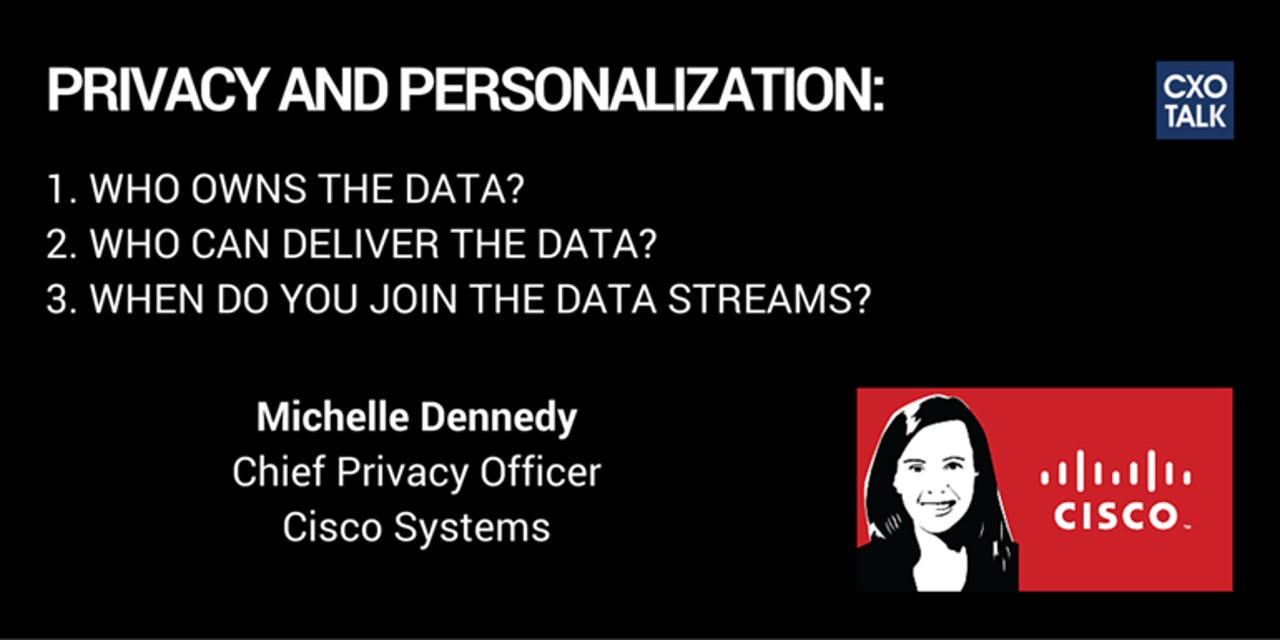#CXOTALK Cisco's Chief Privacy Officer: Marketing, personalization, and trust


Michelle Dennedy, Chief Privacy Officer, Cisco Systems
The related topics of privacy and security are among the most important in technology today.
For marketers, the balance between personalization and privacy is delicate. Too much personalization and the audience feels you are stalking them and being creepy; not enough, and personalization goes away. It's a challenging conundrum with no easy answers.
To address these questions and talk about broader policy, I invited Cisco Systems' Chief Privacy Officer, Michelle Dennedy, to be a guest on CXOTALK. Michelle is one of the preeminent experts on privacy engineering. Her book, The Privacy Engineer's Manifesto, is an important text on the topic and she travels widely giving talks on this topic.
Watch our conversation in the video below and read a complete transcript.
Here is an edited transcript of the portion of our discussion on marketing, personalization, and privacy.
What are the privacy and ethical boundaries that marketers should consider?
Marketing executives want more information for personalization, but I use the first date analogy.
Before a first date, we can Google the person, call their neighbors, call their bosses, follow them around town, and present things based on extensive surveillance. But, you won't get date number two, because guess what? It's super creepy.
The online world isn't all that different. There are times when I simply want to look at shoes because I'm trying in the back of my head to work on a difficult business problem. I don't want you in my face following me around the net with those shoes. I don't want you personalizing and sending me shoes I've already purchased, which drives me nuts.
Personalization is critical, and this is why privacy engineering is profitable, as well as necessary from a compliance perspective. This is where I'm focusing at Cisco today. My team is looking at business models that are enhanced by having a grip on the complexity of human information. For example, knowing that a person is coming down that purchasing funnel, or entering into a sister type of business. Air flight and rental cars have been a great analogy from the early days of the federated identity discussion.
The key is understanding:
- Who owns what?
- Who can deliver on what?
- When is the perfect moment to join all those information streams?
And, importantly for your compliance efforts in light of the latest European legislation, how do you dis-join sections of that information appropriately, so you don't lose the whole customer when they opt out of a subscription mailing from you.
Think hard about the components of a relationship, and consider how to lift and separate and curate them.
What about trust and platforms?
Facebook is such an interesting example. Myspace was king until a young girl went to meet someone online she didn't know. It turned out that he was a murderous rapist. Suddenly Myspace was no longer this cool music sharing platform., but a dangerous place where you don't know anyone.
At that perfect psychological moment, in comes this nice, clean-cut boy from Harvard, and the only people who can get on the platform are nice, clean-cut people from Harvard, and then from the London School of Economics and then Stanford.
The interesting thing to me economically is how did they beat out Myspace, Homestead, At Home? All these names that many people probably don't even remember. It was the authentication piece that won the day.
What's the relationship between trust, privacy, personalization, and customer loyalty?
Privacy and trust absolutely are married to each other and only exist over time. The question of personalization is so important. Don't be afraid to take a little time. Don't be afraid to build a true human relationship and to respect that with tools. You know, loyalty cards that treat their loyalty guests with meal deals, those things are sticky.
Join CXOTALK for conversations on leadership, innovation, and digital disruption. See the complete schedule at cxotalk.com/episodes